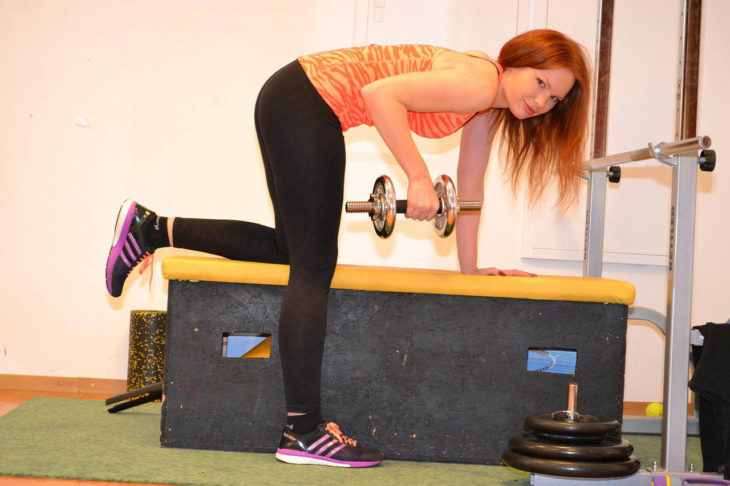
Strength training is a healthy fitness trend that’s really taken off in recent years. This form of exercise uses resistance to tone muscles and improve strength and endurance. You can incorporate the use of resistance bands, use isometrics and even plyometrics (jump training) but most people associate strength training with lifting weights.
If you incorporate weight training into your fitness routine, you may wonder if you can safely continue your practice while trying to conceive or if this form of fitness training could interfere with your fertility. Doctors agree that regular, moderate physical activity is beneficial to fertility. In addition to keeping you physically fit, a good workout is a great remedy for life’s stressors and infertility is stressful!
Working Out While Trying to Conceive
So the common rule-of-thumb when it comes to exercise and your fertility is this: If you were regularly working out before you may continue to do so. If you start a new fitness routine or haven’t worked out prior to trying to conceive, discuss your plans with your doctor.
While fitness is excellent for overall wellness of mind and body Your doctor may recommend that you go easy with some workout routines while undergoing fertility treatment. Depending on the amount of time you spend on your strength training and whether your workout involves any heavy lifting your fitness routine may adversely impact your ability to conceive.
How Strength Training Helps You on Your Fertility Journey
A regular practice of moderate exercise (no more than five hours per week) is actually just what the doctor ordered when it comes to overall wellness. Maintaining your health throughout your fertility journey is highly important. In fact, moderate exercise, along with a healthy diet actually, in some cases, improves your ability to become pregnant.
Not only that, but moderate exercise also:
- Reduces the risks for pregnancy-threatening conditions such as eclampsia and gestational diabetes.
- Helps you maintain your healthy BMI or weight your physician approves.
- Tones your muscles and improves bone strength which aid in a healthy pregnancy and delivery.
- A regular practice of moderate exercise helps you decrease your risk for depression and anxiety by providing a healthy outlet for stress.
And to add to the benefits of exercise, strength training itself certainly offers many additional benefits:
- Strength training improves how well your body burns calories (metabolic efficiency).
- Improves your balance, which is very important as your pregnancy grows.
- Promotes more flexibility and mobility.
- Improves your confidence which may take a beating when dealing with infertility.
- Targets abdominal fat, a big risk for many chronic diseases.
- Builds strength and endurance, a great benefit not only for pregnancy and delivery but for the rest of your life.
Weight Training is OK, But…
Given all of those benefits you may wonder what the downside of strength training is for those trying to conceive. Well, as mentioned above, if you’ve been practicing strength training regularly there pretty much is no downside. Except when it comes to lifting weights and the duration of your fitness routine.
If lifting is your preferred workout, it’s still possible to lift with some caveats. The main concern doctors have with lifting weight is your risk of injury is greater. Opt for lighter weights and increase your reps if you feel youth need. Better yet find strength training workouts that use bands or your own body weight, such as some calisthenics. Just make sure you discuss your plans with your physician and avoid jumping or jarring movements, twisting and lunging forcefully.
Weigh These Alternatives to Lifting
Some alternatives to strength training using weights? In addition to lightening your weight load for lifting you could incorporate yoga, pilates, walking at an incline and even a modified HIIT workout. Again, run all of this by your physicians for their approval before you begin.
When to Pause Your Workouts
Your doctor may advise you to pump the brakes on your workouts at certain points of your fertility treatment or IVF cycle, specifically the week of egg retrieval. At that time in your cycle your ovaries swell from the stimulating medication and you’re at risk for developing ovarian torsion.
Ovarian torsion is a rare condition in which the ovary twists on its supporting ligament. This cuts off the blood supply to the already-inflamed ovary. This condition is severely painful and, although rare, vigorous physical activity such as working out full throttle may exacerbate the risk. It’s also advisable to avoid any strenuous strength training during the two-week wait after an embryo transfer with IVF.
Your Partner for The Journey
A healthy and happy pregnancy with a successful outcome is our common goal. For more information on fertility treatments contact LA IVF today. We’re with you for the journey to grow your family.










